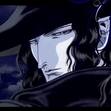Kathryn Troy's Blog, page 14
September 2, 2018
Not His Masterpiece: The Shape of Water
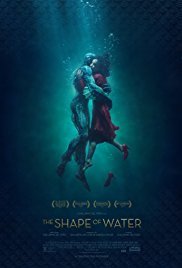 I'm behind on the buzz for
The Shape of Water
- I know, I know. Especially for someone like me who really really loves Guillermo Del Toro and supports all his projects. But I have to say it - I was not that impressed with this piece. It doesn't come close to Pan's Labyrinth, which really is his master work. The mood and the setting were great, the picture was beautiful, as was the creature design, but the plot left a whole lot to be desired.
I'm behind on the buzz for
The Shape of Water
- I know, I know. Especially for someone like me who really really loves Guillermo Del Toro and supports all his projects. But I have to say it - I was not that impressed with this piece. It doesn't come close to Pan's Labyrinth, which really is his master work. The mood and the setting were great, the picture was beautiful, as was the creature design, but the plot left a whole lot to be desired.The premise that a humble female factory worker sympathizes with the Creature from the Black Lagoon (that's what he is, don't kid yourself), and will eventually fall in love with him, set him free, and follow him back into the sea is not really new. (See Splash). It's an interesting alternate-reality for the 1950s, but it does read a bit like Mad Men in its display of chauvinism. The message of otherness throughout the film (the protagonists are a fish-man, a mute woman with dormant scales, a black woman, and a gay man), are necessary, to a degree, and timely, but they're also a bit too transparent for my taste.
Maybe what I wanted from this was a bit more of the Labyrinth. By that, I mean more of the mystery and wonder inherent in such a tale. There's a short bit of dialogue that says the Creature had been worshipped as a god by the humans near its natural habitat. I would have liked to see such things be more developed, to see more of this ancient godhood invading the "present" of the film somehow. That might have hooked me. (lame pun intended).
For now, I have to take solace in the fact that even if this wasn't my favorite Del Torro film, it received high kudos, and that can only mean good things for Del Torro's projects in the future. So please, Del Torro, bring back the dream of At the Mountains of Madness .
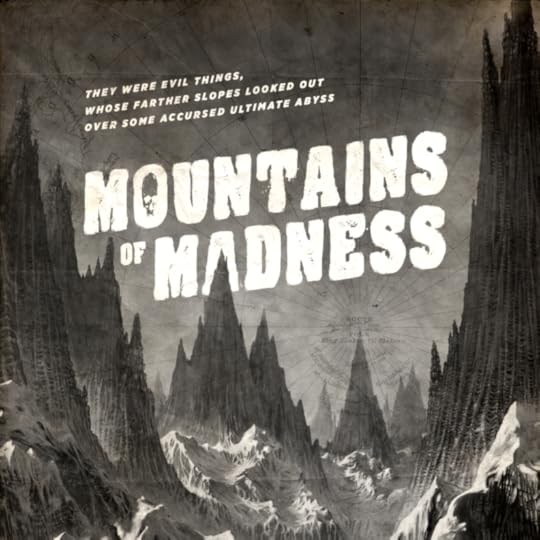 I need this. I need this more than anything else I can think of.
I need this. I need this more than anything else I can think of.
Published on September 02, 2018 16:31
August 24, 2018
So Moody...So Muddled: The Retreat
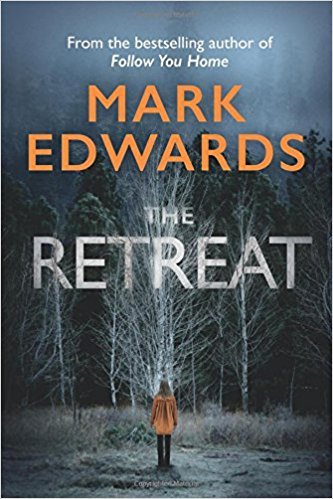 I've been putting off reading horror or strange fiction in favor of other interests that don't get as much attention - historical fiction, mystery - so I was eager to come back to my favorite genre, and started with a promising title,
The Retreat
. Though I don't normally read about writers experiencing things out of their own books, the premise of this book hooked me - a writer returns to his small, insular hometown in Wales to escape life's tragedies, but finds that the tragedies that prompted his parents to leave when he was young are repeating themselves again.
I've been putting off reading horror or strange fiction in favor of other interests that don't get as much attention - historical fiction, mystery - so I was eager to come back to my favorite genre, and started with a promising title,
The Retreat
. Though I don't normally read about writers experiencing things out of their own books, the premise of this book hooked me - a writer returns to his small, insular hometown in Wales to escape life's tragedies, but finds that the tragedies that prompted his parents to leave when he was young are repeating themselves again.The story went in a lot of different directions. It's a haunted house story, because the writing retreat he's staying at showcases things disappearing and weird singing from inside the walls at night, emanating either from the room of a child gone missing two years ago, or the abandoned mine underneath the property.
The missing child who allegedly drowned in the river was never found; she is believed by the townsfolk to be the latest victim of the Red Widow, a local legend of a child-eating witch. The imagery for these aspects of the story were awesome, and I like the wrinkle that the townsfolk have traditionally offered sacrifices to her, children who will not be sorely missed, in order to protect their own kin. That put a grim veil over all the characters in the book that was much appreciated.
Then there are hints of what happened to the missing child two years ago from her own point of view, before, during, and after her disappearance. Without spoiling the book, I can say that we get more information about the town's secrets, in her past and in the Widow's long past, and not all of them are supernatural.
Oh, right. And then there's a spiritualist writer staying at the retreat, who knows things that she couldn't possibly know...or could she?
The mood of the writing - the bleak, tragedy-laden world of the characters, and the idea that there's more than one secret to uncover - that was rewarding. But on the other hand, the story pulled me in so many directions, and in the end it just couldn't hold it all together. There were too many story threads that get dropped in favor of other, more tropey, less enticing solutions. So the things that I liked the most, like the Red Widow, felt like a great concept that was underdeveloped, and therefore wasted on a story that went in a different direction. The book tried to do so much, and give you so many red herrings that it ended up unraveling the cohesion you feel in the first portions of the book when you're just digging your heels into the plot and gaining interest. Which is a shame.
K. Rating: 2.5/5
Published on August 24, 2018 21:24
August 18, 2018
End of Summer Deal - Frostbite Series!
Spent all your money on suntan lotion and booze? No problem! With A Vision in Crimson free and Dreams of Ice and Shadow on sale for only 99¢, you really can have it all this summer. Click below to grab your copies of Frostbite Books 1 & 2 before time runs out on the 23rd.

Frostbite Book 1: A Vision in Crimson FREE ON AMAZON!
Katelyn knows her magic is risky, but Icaryan light is fading fast and she is desperate. Her narrowing path leads her to Luca, a vampire hybrid living on the outskirts of humanity. Mutual attraction ignites their weary hearts. The rogue hunter follows Katelyn into a world teeming with wonder and danger, forsaking his own quest to root out his father.
But his father has not forgotten him.
A Vision in Crimson is the first book of a dark epic fantasy fraught with passion, peril, and magic.
Frostbite Book 2: Dreams of Ice and Shadow ONLY 99¢ on AMAZON!
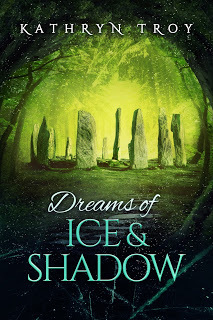 Luca has discovered his father's hideout. He hunts the legendary vampire alone, pushing Katelyn away to safety. But Dracula is not so easily bested. He evades Luca so he can tap into Katelyn's power--the magic that lies at the heart of Icarya. Luca's heart sinks as his father draws him further and further from his eternal love.
Luca has discovered his father's hideout. He hunts the legendary vampire alone, pushing Katelyn away to safety. But Dracula is not so easily bested. He evades Luca so he can tap into Katelyn's power--the magic that lies at the heart of Icarya. Luca's heart sinks as his father draws him further and further from his eternal love.
Across the Great Sea, Katelyn is summoned to the slave city Likhan. After the death of Seht Reza, Likhan teeters toward revolution as her nephew Darien seeks the throne. To help him, Kate must work alongside Alaric, the assassin who will stop at nothing to win her back in Luca's absence. The dark forces mounting against Darien leave Kate vulnerable to the destructive pull of her elemental nature.
Dreams of Ice and Shadow is the heart-stopping second volume of the Frostbite series, where gothic terrors invade epic fantasy. Sinister, unnatural horrors are unleashed, and Katelyn and Luca's passions burn brighter than ever as the dangers facing Icarya threaten to separate them forever.
 A Bonus Map for Dreams of Ice and Shadow readers
A Bonus Map for Dreams of Ice and Shadow readers

Frostbite Book 1: A Vision in Crimson FREE ON AMAZON!
Katelyn knows her magic is risky, but Icaryan light is fading fast and she is desperate. Her narrowing path leads her to Luca, a vampire hybrid living on the outskirts of humanity. Mutual attraction ignites their weary hearts. The rogue hunter follows Katelyn into a world teeming with wonder and danger, forsaking his own quest to root out his father.
But his father has not forgotten him.
A Vision in Crimson is the first book of a dark epic fantasy fraught with passion, peril, and magic.
Frostbite Book 2: Dreams of Ice and Shadow ONLY 99¢ on AMAZON!
 Luca has discovered his father's hideout. He hunts the legendary vampire alone, pushing Katelyn away to safety. But Dracula is not so easily bested. He evades Luca so he can tap into Katelyn's power--the magic that lies at the heart of Icarya. Luca's heart sinks as his father draws him further and further from his eternal love.
Luca has discovered his father's hideout. He hunts the legendary vampire alone, pushing Katelyn away to safety. But Dracula is not so easily bested. He evades Luca so he can tap into Katelyn's power--the magic that lies at the heart of Icarya. Luca's heart sinks as his father draws him further and further from his eternal love.Across the Great Sea, Katelyn is summoned to the slave city Likhan. After the death of Seht Reza, Likhan teeters toward revolution as her nephew Darien seeks the throne. To help him, Kate must work alongside Alaric, the assassin who will stop at nothing to win her back in Luca's absence. The dark forces mounting against Darien leave Kate vulnerable to the destructive pull of her elemental nature.
Dreams of Ice and Shadow is the heart-stopping second volume of the Frostbite series, where gothic terrors invade epic fantasy. Sinister, unnatural horrors are unleashed, and Katelyn and Luca's passions burn brighter than ever as the dangers facing Icarya threaten to separate them forever.
 A Bonus Map for Dreams of Ice and Shadow readers
A Bonus Map for Dreams of Ice and Shadow readers
Published on August 18, 2018 05:50
August 13, 2018
Nothing...and then the Kitchen Sink: Wolf Winter
I was drawn into Cecelia Ekback's
Wolf Winter
.by suggestions of something harsh, terrible, and not altogether human in the desolate Swedish mountains. What I got was bamboozled by vivid writing into reading a story that was about nothing for about 90 % of the time.
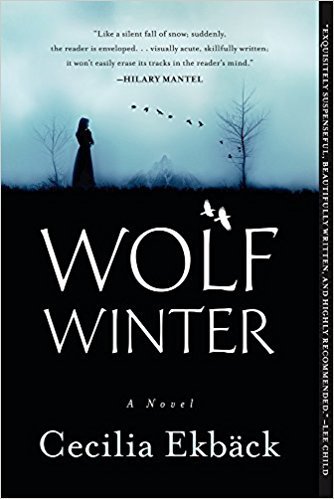
It started off well enough, with the young Fredericka finding a mutilated corpse. Her mother, Maija, has a keen eye for detail, and realizes that the late Eriksson was done in by a human, not a wolf. She may have a gift of second sight, or a cunning woman's healing, or be able to speak to spirits. I can't tell. The book never decided. But for when real characters aren't developed you can always count upon the "newly demoted priest" to take an interest, if forced, into discovering whodunnit.
That was the first few pages. Then winter happened, and well, nothing happened. It was all very detailed, all very drawn out, and the pacing was an absolute killer. But here and there were hints of plot, so I plodded right along, taking longer to finish this book than any other title I can remember in at least a year. There is a very vehement attempt to be atmospheric. And while I certainly understood the daunting nature of living up in the middle of absolute nowhere in the 1700s, the supernatural intentions for the story were schizophrenic; there was a ghost that didn't act like a ghost (and by that, I mean altogether too human and corporeal), mountain spirits that were never described, even in amorphous terms, and overlapping and contradictory references to past occultish events (ie witch trials) not included anywhere in the text and therefore made irrelevant, though the book would have you believe something that never "happened" in the story is the cornerstone of character.
What had been a heap of excrutiatingly detailed nothing became everything, and any semblance of plot structure, coherence, or internal logic went right out the window. Fuck pacing. The last fifty or so pages felt rushed and slapped together out of too many little threads that didn't connect to each other in any meaningful way. Oh right, and then there was the mystery to solve, so that was handled in hideously tropish fashion.
I haven't felt so spent from reading a book in some time. And I don't appreciate my time being wasted by books pretending to be something they aren't. Literally from nowhere, the resolution to the plot involved political tensions that didn't exist for the entire book, and hence literally made no sense. In the Author Note at the back of the book, Ekback gives all kinds of historical context, but none of that found its way into the book itself-it had zero connection to anything of substance in the story, if I can even say there was substance. (I can't.) The part that really had me fuming was where she admitted that she threw a bunch of ideas together about paganism and witchcraft, b/c she couldn't find anything authentic. About paganism and witchcraft in Europe during the trial years. Nope, no one's ever written about that, or recorded pre-Christian cultures. 0_0
I understand it's fiction and all, so maybe this isn't the best way to say it. But when you're writing a story, especially a piece of historical fiction, you can't just make shit up.
K Rating: 1/5
[image error] If I get stuck here, I'm NOT bringing Wolf Winter. I'd rather be eaten by the real deal.

It started off well enough, with the young Fredericka finding a mutilated corpse. Her mother, Maija, has a keen eye for detail, and realizes that the late Eriksson was done in by a human, not a wolf. She may have a gift of second sight, or a cunning woman's healing, or be able to speak to spirits. I can't tell. The book never decided. But for when real characters aren't developed you can always count upon the "newly demoted priest" to take an interest, if forced, into discovering whodunnit.
That was the first few pages. Then winter happened, and well, nothing happened. It was all very detailed, all very drawn out, and the pacing was an absolute killer. But here and there were hints of plot, so I plodded right along, taking longer to finish this book than any other title I can remember in at least a year. There is a very vehement attempt to be atmospheric. And while I certainly understood the daunting nature of living up in the middle of absolute nowhere in the 1700s, the supernatural intentions for the story were schizophrenic; there was a ghost that didn't act like a ghost (and by that, I mean altogether too human and corporeal), mountain spirits that were never described, even in amorphous terms, and overlapping and contradictory references to past occultish events (ie witch trials) not included anywhere in the text and therefore made irrelevant, though the book would have you believe something that never "happened" in the story is the cornerstone of character.
What had been a heap of excrutiatingly detailed nothing became everything, and any semblance of plot structure, coherence, or internal logic went right out the window. Fuck pacing. The last fifty or so pages felt rushed and slapped together out of too many little threads that didn't connect to each other in any meaningful way. Oh right, and then there was the mystery to solve, so that was handled in hideously tropish fashion.
I haven't felt so spent from reading a book in some time. And I don't appreciate my time being wasted by books pretending to be something they aren't. Literally from nowhere, the resolution to the plot involved political tensions that didn't exist for the entire book, and hence literally made no sense. In the Author Note at the back of the book, Ekback gives all kinds of historical context, but none of that found its way into the book itself-it had zero connection to anything of substance in the story, if I can even say there was substance. (I can't.) The part that really had me fuming was where she admitted that she threw a bunch of ideas together about paganism and witchcraft, b/c she couldn't find anything authentic. About paganism and witchcraft in Europe during the trial years. Nope, no one's ever written about that, or recorded pre-Christian cultures. 0_0
I understand it's fiction and all, so maybe this isn't the best way to say it. But when you're writing a story, especially a piece of historical fiction, you can't just make shit up.
K Rating: 1/5
[image error] If I get stuck here, I'm NOT bringing Wolf Winter. I'd rather be eaten by the real deal.
Published on August 13, 2018 16:53
August 5, 2018
Slowly & Deeply Disturbing - The Sinner
[image error]
Just as
The Sinner
is gearing up for its second season, I discovered the first season. I'd seen a trailer at the time of its initial release on USA, but the story of a woman who kills someone in cold blood on a beach and doesn't know why didn't really appeal at the time. Add in that I actively dislike Jessica Biel, and there you go.
But summertime is the time to watch what's easily accessible, and there is Bill Pullman in there, who I do like. Very much.
I binged the show, sucked in by the hypnotic, suggestive patterns of the wallpaper and dark, grungy song that set Cora Tannetti into a murderous rage. The telling of the story is not a straight procedural, because you know from the beginning whodunnit - you've seen it with your own eyes. It is crystal clear from the moment the show opens that something is wrong with Cora, and the tension of the film comes from the out-of-the-blue nature of her crime. Our sense of human nature tells us that nobody just up and kills someone for no reason, so Detective Ambrose (Pullman) becomes hell-bent on figuring out why she would do such a thing.
The splicing of the current investigation with Cora's recurring visions, hypnotic trances, and returning memories was masterful. Lots of things were bothersome - not necessarily new to me, but very bothersome nonetheless - an abusive zealot for a mother, an opportunistic, exploitative boyfriend, a manipulative sister, drugs, sex, coverups...you get the idea. But all were shown with a sharp, deliberate hand that painted the most sinister image possible with these bits and pieces. There was a darkness that I felt was akin to the unease produced by Buffalo Bill in his few scenes from Silence of the Lambs. I felt the power of these images and memories without being able to put them all together for myself until the end, and that made the realization that there was in fact a reason, and we're on a journey to find it immensely rewarding. The way in which the characters react to all these events, both in the past and the present, showed the darkest sides of human nature at almost every turn, and it cast an oppressively hard, desperate, sickening pall over the whole show.
There were some tangential things that weren't as appealing, but they took up so little time that I didn't feel the story was bogged down by them. The biggest example was the relationship between Dt. Ambrose and his wife -I understand why that was put in there, but I didn't need that. It didn't add to the story for me, except towards the end, where we get a hint of rationale for Ambrose's behavior, and it connects him to Cora in a way that explains his drive to get to the bottom of her situation.
I understand that the second season is a different storyline, but if the aesthetic and/or the mission of storytelling is anything like this season, it will be something you don't want to miss. So if you're into dark, high-minded thrillers, don't miss this one.
K Rating: 4/5
 That's not at all suggestive...0_0
That's not at all suggestive...0_0
But summertime is the time to watch what's easily accessible, and there is Bill Pullman in there, who I do like. Very much.
I binged the show, sucked in by the hypnotic, suggestive patterns of the wallpaper and dark, grungy song that set Cora Tannetti into a murderous rage. The telling of the story is not a straight procedural, because you know from the beginning whodunnit - you've seen it with your own eyes. It is crystal clear from the moment the show opens that something is wrong with Cora, and the tension of the film comes from the out-of-the-blue nature of her crime. Our sense of human nature tells us that nobody just up and kills someone for no reason, so Detective Ambrose (Pullman) becomes hell-bent on figuring out why she would do such a thing.
The splicing of the current investigation with Cora's recurring visions, hypnotic trances, and returning memories was masterful. Lots of things were bothersome - not necessarily new to me, but very bothersome nonetheless - an abusive zealot for a mother, an opportunistic, exploitative boyfriend, a manipulative sister, drugs, sex, coverups...you get the idea. But all were shown with a sharp, deliberate hand that painted the most sinister image possible with these bits and pieces. There was a darkness that I felt was akin to the unease produced by Buffalo Bill in his few scenes from Silence of the Lambs. I felt the power of these images and memories without being able to put them all together for myself until the end, and that made the realization that there was in fact a reason, and we're on a journey to find it immensely rewarding. The way in which the characters react to all these events, both in the past and the present, showed the darkest sides of human nature at almost every turn, and it cast an oppressively hard, desperate, sickening pall over the whole show.
There were some tangential things that weren't as appealing, but they took up so little time that I didn't feel the story was bogged down by them. The biggest example was the relationship between Dt. Ambrose and his wife -I understand why that was put in there, but I didn't need that. It didn't add to the story for me, except towards the end, where we get a hint of rationale for Ambrose's behavior, and it connects him to Cora in a way that explains his drive to get to the bottom of her situation.
I understand that the second season is a different storyline, but if the aesthetic and/or the mission of storytelling is anything like this season, it will be something you don't want to miss. So if you're into dark, high-minded thrillers, don't miss this one.
K Rating: 4/5
 That's not at all suggestive...0_0
That's not at all suggestive...0_0
Published on August 05, 2018 15:38
July 4, 2018
Reading List - Summer of Serials
We all remember Summer reading lists. Sometimes they were terrible (Of Mice and Men), and sometimes they were awesome (Dracula). But summertime is also the time of the TV Re-run, when the best thing on television is the stuff you already know and love.
We have something like that in books. A series can be a great thing, especially for epic storytelling and for following lovable characters through more than one adventure. And they're better than re-runs, because they're sort of the same, but they're sort of new. They are comfortable and exciting at the same time, and there might be no greater pleasure in beachside reading than that. So feel free to add your own reads-in-progress in the comments, but these are the series that I'll be returning to this season:
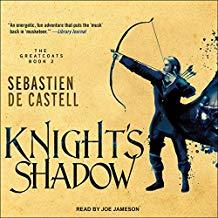 The Greatcoats #2: The Knight's Shadow - I love the three Musketeers. Throw some enchantments into the mix, and this is what you get!
The Greatcoats #2: The Knight's Shadow - I love the three Musketeers. Throw some enchantments into the mix, and this is what you get!
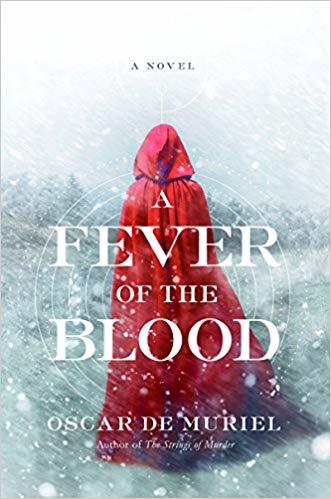
Legends of the First Empire #3: The Age of War - It's been a fun ride all around, and I want to see where this fantasy adventure takes the Godkiller next!
The Traitor Spy Trilogy #1: Ambassador's Mission - technically this is the first in this trilogy, but it is a continuation of one of my favorite trilogies of all time, The Black Magician trilogy. I can't wait to get back to Canavan's incredible, fast-paced fantasy.
Frey and McGray Mystery #2: A Fever of the Blood - The first book, The Strings of Murder , was one of the best, most original historical fiction/mystery novels I've read in forever. And I love Frey AND McGray- they're phenomenal. I can't wait for the new shenanigans that await me.
The Kingfountain Series #2: The Thief's Daughter - the start of this series was a refreshing dose of the wonder-laden side of fantasy. I can only hope that Owen as a young man is just as charming a character, and that he finds that underwater treasure!
The Crown's Game #2: The Crown's Fate - I'll admit, this wasn't my favorite fantasy I read this year, but I care enough about the characters to want to know what happens. So I'll keep reading.
The Lady Sherlock Series #2: A Conspiracy in Belgravia - now this book I can't wait to sink my teeth into. This is the best alternate iteration of Sherlock Holmes I never knew I needed.
The Man in the Iron Mask - It's finally, time, after all this time, from first reading The Three Musketeers as a high-school student, to the thrilling final tale of D'Artagnan, Porthos, Athos, and Aramis, and the very best adventure ever written. Je suis prêt.
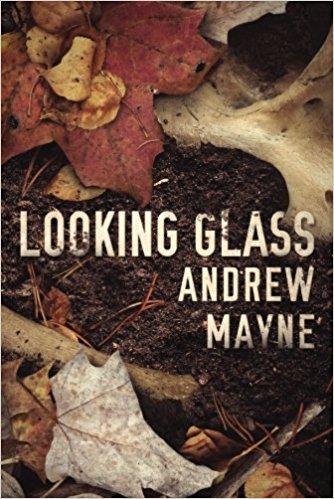
The Naturalist #2 - Looking Glass - this book's analytic wit paired with crime investigation and local legend was such a pleasant surprise. I'm intrigued by this second pairing with Alice in Wonderland.
The Demon Cycle #3:The Daylight War - Brett has the best mix of action, horror, fantasy, and adventure right now. And this next installment promises to be a doozy.
The Cemetery of Forgotten Books #2: The Angel's Game - Thrillers about old books really only work when the writer is superb. And Carlos Ruiz Zafon is the best.
The Chronicles of Brother Cadfael #1 - A Morbid Taste for Bones - If the Kindle sample is any indication, Brother Cadfael is going to be my new favorite medieval sleuth.
Summer is going to be busy indeed! This doesn't even touch the series I've yet to start, or other standalone titles waiting their turn on the shelf! If you're unfamiliar with any of these series, don't worry. I've reviewed their beginning titles - that's what the search bar is for!
So go hit the beach, and hit the books!

We have something like that in books. A series can be a great thing, especially for epic storytelling and for following lovable characters through more than one adventure. And they're better than re-runs, because they're sort of the same, but they're sort of new. They are comfortable and exciting at the same time, and there might be no greater pleasure in beachside reading than that. So feel free to add your own reads-in-progress in the comments, but these are the series that I'll be returning to this season:
 The Greatcoats #2: The Knight's Shadow - I love the three Musketeers. Throw some enchantments into the mix, and this is what you get!
The Greatcoats #2: The Knight's Shadow - I love the three Musketeers. Throw some enchantments into the mix, and this is what you get!
Legends of the First Empire #3: The Age of War - It's been a fun ride all around, and I want to see where this fantasy adventure takes the Godkiller next!
The Traitor Spy Trilogy #1: Ambassador's Mission - technically this is the first in this trilogy, but it is a continuation of one of my favorite trilogies of all time, The Black Magician trilogy. I can't wait to get back to Canavan's incredible, fast-paced fantasy.
Frey and McGray Mystery #2: A Fever of the Blood - The first book, The Strings of Murder , was one of the best, most original historical fiction/mystery novels I've read in forever. And I love Frey AND McGray- they're phenomenal. I can't wait for the new shenanigans that await me.
The Kingfountain Series #2: The Thief's Daughter - the start of this series was a refreshing dose of the wonder-laden side of fantasy. I can only hope that Owen as a young man is just as charming a character, and that he finds that underwater treasure!
The Crown's Game #2: The Crown's Fate - I'll admit, this wasn't my favorite fantasy I read this year, but I care enough about the characters to want to know what happens. So I'll keep reading.
The Lady Sherlock Series #2: A Conspiracy in Belgravia - now this book I can't wait to sink my teeth into. This is the best alternate iteration of Sherlock Holmes I never knew I needed.
The Man in the Iron Mask - It's finally, time, after all this time, from first reading The Three Musketeers as a high-school student, to the thrilling final tale of D'Artagnan, Porthos, Athos, and Aramis, and the very best adventure ever written. Je suis prêt.

The Naturalist #2 - Looking Glass - this book's analytic wit paired with crime investigation and local legend was such a pleasant surprise. I'm intrigued by this second pairing with Alice in Wonderland.
The Demon Cycle #3:The Daylight War - Brett has the best mix of action, horror, fantasy, and adventure right now. And this next installment promises to be a doozy.
The Cemetery of Forgotten Books #2: The Angel's Game - Thrillers about old books really only work when the writer is superb. And Carlos Ruiz Zafon is the best.
The Chronicles of Brother Cadfael #1 - A Morbid Taste for Bones - If the Kindle sample is any indication, Brother Cadfael is going to be my new favorite medieval sleuth.
Summer is going to be busy indeed! This doesn't even touch the series I've yet to start, or other standalone titles waiting their turn on the shelf! If you're unfamiliar with any of these series, don't worry. I've reviewed their beginning titles - that's what the search bar is for!
So go hit the beach, and hit the books!

Published on July 04, 2018 17:21
June 18, 2018
Eureka! The Woman in Cabin 10
If you've been following my blog lately, you will have heard me say more than one time that I am on the hunt for great contemporary mystery writers. Lots of recent attempts have fallen far short of that mark, but Ruth Ware's
The Woman in Cabin 10
exceeded my wary expectations.
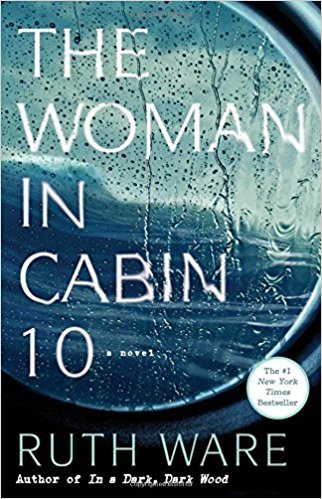
I normally stay away from books getting a lot of hype-most of the time, I find that kind of praise to be misplaced. But I couldn't deny that my interest was piqued by the premise of a murder onboard a ship. I have an affinity for the ship in particular as a breeding ground for strange things in fiction - the limited quarters allows for tantalizing wrinkles in the story, like the one here, in which the journalist Lo Blacklock believes she has witnessed a murder, except for the fact that everyone aboard the ship seems to be accounted for.
In this case, the accolades Ware has received as the next Agatha Christie are not an exaggeration. The tight ensemble cast were all intriguing in their own ways, and their suspicious behaviors were so cleverly written that I could not easily suss out the resolution. I was drawn in by the story's complexity and all the possible trajectories, and that was rewarding - if I'd been able to figure it all out on my own, I might have been disappointed by that.
Something I haven't seen as often, in this genre at least, was the idea of the unreliable narrator. The fact that Lo was drinking heavily the night before she witnesses what she believes to have been a murder was to me a master stroke, and added yet another set of possibilities for the story that took the plot in some unexpected directions.
Perhaps the one downside to this story was its ending - the resolution of the mystery hewed slightly more closely to tropish expectations than I anticipated, given the freshness of the rest of the story, and without giving anything away, there is a tonal shift towards the end of the plot that, while interesting, didn't seem to match what I'd been reading up to that point, and it left me wondering if maybe some other possibility might have been more satisfying.
In any event, I could not put this book down, and that was a great feeling after a long slog of mediocre-at-best works. The next Ware book, The Lying Game , deals with another favorite setting of mine: the boarding school. I'm practically salivating.
K. Rating: 5/5
 *sigh* If not for the fact that I'd get so dizzy I'd likely tip overboard,
*sigh* If not for the fact that I'd get so dizzy I'd likely tip overboard,
travelling like this might be pretty cool

I normally stay away from books getting a lot of hype-most of the time, I find that kind of praise to be misplaced. But I couldn't deny that my interest was piqued by the premise of a murder onboard a ship. I have an affinity for the ship in particular as a breeding ground for strange things in fiction - the limited quarters allows for tantalizing wrinkles in the story, like the one here, in which the journalist Lo Blacklock believes she has witnessed a murder, except for the fact that everyone aboard the ship seems to be accounted for.
In this case, the accolades Ware has received as the next Agatha Christie are not an exaggeration. The tight ensemble cast were all intriguing in their own ways, and their suspicious behaviors were so cleverly written that I could not easily suss out the resolution. I was drawn in by the story's complexity and all the possible trajectories, and that was rewarding - if I'd been able to figure it all out on my own, I might have been disappointed by that.
Something I haven't seen as often, in this genre at least, was the idea of the unreliable narrator. The fact that Lo was drinking heavily the night before she witnesses what she believes to have been a murder was to me a master stroke, and added yet another set of possibilities for the story that took the plot in some unexpected directions.
Perhaps the one downside to this story was its ending - the resolution of the mystery hewed slightly more closely to tropish expectations than I anticipated, given the freshness of the rest of the story, and without giving anything away, there is a tonal shift towards the end of the plot that, while interesting, didn't seem to match what I'd been reading up to that point, and it left me wondering if maybe some other possibility might have been more satisfying.
In any event, I could not put this book down, and that was a great feeling after a long slog of mediocre-at-best works. The next Ware book, The Lying Game , deals with another favorite setting of mine: the boarding school. I'm practically salivating.
K. Rating: 5/5
 *sigh* If not for the fact that I'd get so dizzy I'd likely tip overboard,
*sigh* If not for the fact that I'd get so dizzy I'd likely tip overboard,travelling like this might be pretty cool
Published on June 18, 2018 17:35
June 3, 2018
The Queen's Poisoner - A Wondrous Tale
There are two kinds of magic when reading fantasy. The first is the obvious - witches and sorcerers, spells and grimoires, in whatever form they may take. The second kind of magic is one that populates the world with wonder, with lore and mystery, and perhaps, the wonder of a world seen through the eyes of a child. This second kind of magic is harder to achieve, but The Queen's Poisoner has it in spades.
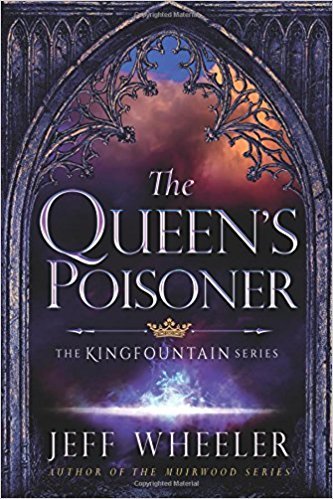 The beginning of the Kingfountain series focuses on young Owen Kiskaddon, sent away from his family to live in the castle of King Severn, a ward given to the king as punishment for his family's disloyalty. But like all fantasy heroes, Owen is not alone for long, as the kitchen workers, a female ward about his age, a royal spy, and the queen's poisoner all work together, sometimes reluctantly, to keep Owen and his family safe from the king's cruel and tyrannous ways.
The beginning of the Kingfountain series focuses on young Owen Kiskaddon, sent away from his family to live in the castle of King Severn, a ward given to the king as punishment for his family's disloyalty. But like all fantasy heroes, Owen is not alone for long, as the kitchen workers, a female ward about his age, a royal spy, and the queen's poisoner all work together, sometimes reluctantly, to keep Owen and his family safe from the king's cruel and tyrannous ways.
What I really appreciated about this series was the cohesive theme of fountains as the source of the sacred, and the idea of being "Fountain-blessed" as a sort of analogy to the old world's divine right of kings, as well as to a select few who are gifted with special abilities. It gave the mystical, spiritual elements of the plot something that tied them all together and made them feel complex, important, and intriguing.
That sense of wonder was increased tenfold by the storytelling that revolved around Owen and Elizabeth Victoria Mortimer as they explore the castle, finding forbidden wells, secret paths, and lots of terrific hiding spaces for them to listen in on the political machinations of the grown-ups. I especially like stories centering on mystical spaces, and The Queen's Poisoner has so many good ones to choose from. It's rare that my inclination for such things is satisfied in fiction - that's what makes this book really cool for me. The idea started in this book and, I assume, continued throughout the series, that Owen is one of the rare fountain-blessed piqued my interest. With a secret underwater treasure that no one but him can see, how could it not be?
The characterization is top-notch. Sure, there are some character types at work here - I mentioned the helpful kitchen workers - but at the same time, none of them felt stale. They are all fully developed, and so I as a reader developed compassion for them, finding each person compelling in their own histories and aspirations, especially as their differing motivations coalesce in Owen's favor (or against it, for his enemies). The rotund spy was one of my favorites, and I found myself laughing out loud as a sign of the rapport I'd built with him-he was perhaps one of the best characters, and I enjoyed the snippets of the espion's writing that prefaced every chapter.
It was also satisfying to see the characterization of King Severn shift over the course of even just this first volume. Amorphous ideas of people, especially those in power, are significantly shaped by reputation and rumor even moreso than fact, and I enjoyed seeing that play out here.
One drawback to this book is that I could have envisioned it being a whole lot longer. There are bits of storytelling that felt rushed. The geographic descriptions of certain places left my mind unable to conjure correctly, which was a bit frustrating, although this problem was sporadic. Some places were described perfectly well. What the book really needed was to flesh out its political backstory. I could tell that the author had it all plotted out in his own head, but since I myself am not Fountain-blessed, it was really hard for me to understand relationships and prior events that I felt were being framed as important. I like the way this sort of thing was handled in The Greatcoats series, where you get a few flashbacks about relevant events as you need them. I really could have used something like that here. There are so many players on the political field that without really seeing them in action, it's hard to keep them all straight in my head.
Be that as it may, I will come hungry and eager to the next book in the series, as the adventures of Lord Owen Kiskaddon continue.
K. Rating: 4.5/5
 C'mon. You know finding magic treasure is pretty freaking awesome.
C'mon. You know finding magic treasure is pretty freaking awesome.
 The beginning of the Kingfountain series focuses on young Owen Kiskaddon, sent away from his family to live in the castle of King Severn, a ward given to the king as punishment for his family's disloyalty. But like all fantasy heroes, Owen is not alone for long, as the kitchen workers, a female ward about his age, a royal spy, and the queen's poisoner all work together, sometimes reluctantly, to keep Owen and his family safe from the king's cruel and tyrannous ways.
The beginning of the Kingfountain series focuses on young Owen Kiskaddon, sent away from his family to live in the castle of King Severn, a ward given to the king as punishment for his family's disloyalty. But like all fantasy heroes, Owen is not alone for long, as the kitchen workers, a female ward about his age, a royal spy, and the queen's poisoner all work together, sometimes reluctantly, to keep Owen and his family safe from the king's cruel and tyrannous ways.What I really appreciated about this series was the cohesive theme of fountains as the source of the sacred, and the idea of being "Fountain-blessed" as a sort of analogy to the old world's divine right of kings, as well as to a select few who are gifted with special abilities. It gave the mystical, spiritual elements of the plot something that tied them all together and made them feel complex, important, and intriguing.
That sense of wonder was increased tenfold by the storytelling that revolved around Owen and Elizabeth Victoria Mortimer as they explore the castle, finding forbidden wells, secret paths, and lots of terrific hiding spaces for them to listen in on the political machinations of the grown-ups. I especially like stories centering on mystical spaces, and The Queen's Poisoner has so many good ones to choose from. It's rare that my inclination for such things is satisfied in fiction - that's what makes this book really cool for me. The idea started in this book and, I assume, continued throughout the series, that Owen is one of the rare fountain-blessed piqued my interest. With a secret underwater treasure that no one but him can see, how could it not be?
The characterization is top-notch. Sure, there are some character types at work here - I mentioned the helpful kitchen workers - but at the same time, none of them felt stale. They are all fully developed, and so I as a reader developed compassion for them, finding each person compelling in their own histories and aspirations, especially as their differing motivations coalesce in Owen's favor (or against it, for his enemies). The rotund spy was one of my favorites, and I found myself laughing out loud as a sign of the rapport I'd built with him-he was perhaps one of the best characters, and I enjoyed the snippets of the espion's writing that prefaced every chapter.
It was also satisfying to see the characterization of King Severn shift over the course of even just this first volume. Amorphous ideas of people, especially those in power, are significantly shaped by reputation and rumor even moreso than fact, and I enjoyed seeing that play out here.
One drawback to this book is that I could have envisioned it being a whole lot longer. There are bits of storytelling that felt rushed. The geographic descriptions of certain places left my mind unable to conjure correctly, which was a bit frustrating, although this problem was sporadic. Some places were described perfectly well. What the book really needed was to flesh out its political backstory. I could tell that the author had it all plotted out in his own head, but since I myself am not Fountain-blessed, it was really hard for me to understand relationships and prior events that I felt were being framed as important. I like the way this sort of thing was handled in The Greatcoats series, where you get a few flashbacks about relevant events as you need them. I really could have used something like that here. There are so many players on the political field that without really seeing them in action, it's hard to keep them all straight in my head.
Be that as it may, I will come hungry and eager to the next book in the series, as the adventures of Lord Owen Kiskaddon continue.
K. Rating: 4.5/5
 C'mon. You know finding magic treasure is pretty freaking awesome.
C'mon. You know finding magic treasure is pretty freaking awesome.
Published on June 03, 2018 17:32
May 27, 2018
Babylon Berlin: Visually Stunning, Intellectually Intriguing
Not much about the Weimar Republic has been represented in popular media. (Stateside at least). But the period between World War I and World War II is made fascinatingly vivid in Netflix's latest German production,
Babylon Berlin
.
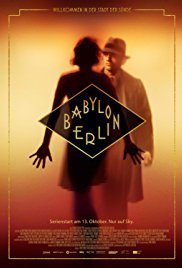 Inspector Gereon Rath, a WWI veteran from Cologne, comes to Berlin, delving quickly into crimes of a political nature- compromising photographs of top officials, contraband trains full of gold and poison gas, attempted coups, and secret attempts to re-arm Germany in violation of the Treaty of Versailles. The investigation of these crimes was compelling to watch, especially when the danger for Gereon and his department hit so close to home.
Inspector Gereon Rath, a WWI veteran from Cologne, comes to Berlin, delving quickly into crimes of a political nature- compromising photographs of top officials, contraband trains full of gold and poison gas, attempted coups, and secret attempts to re-arm Germany in violation of the Treaty of Versailles. The investigation of these crimes was compelling to watch, especially when the danger for Gereon and his department hit so close to home.
As a historian, I deeply appreciated the nature of these crimes as a way for the show to give a realistic window into the tensions and struggles of this transitional period, and present its audience with a narrative that goes against the grain of larger narratives that connect World Wars I and II so intimately that there is practically nothing of significance in Germany after the Treaty of Versailles except the rise of the Nazi Party. This show very deftly and very boldly flouts that historical simplification.
All of the characters were standouts in their own way, making every minute of the show valuable even without the mains on screen, but still--the mains were spectacular. Again, the historian in me reveled at the most realistic representation of shell shock I've ever seen depicted on film/tv, and the drawbacks and successes of Charlotte Ritter, who comes from less that nothing and works her way into being a first-class member of the Berlin police department. She is assertive, witty, resourceful, sensual, and a wonderful example of a working-class woman at the turn of the century.
To top it all off, Babylon Berlin is a visually striking show, pulling expertly from its source material to add authentic flavor and compelling framing to the period piece. The emphasis on the culture of Berlin, thriving on art and modernity, makes this show something really special. The scenes inside the dance halls were some of my absolute favorites - those kinds of spaces are not well represented so often, yet those are the centers of culture. Babylon Berlin nails it, and with the end of the second season (shown as one long season on Netflix) displaying so much chaos, I sincerely hope there is more of this show to come.
K. Rating: 5/5

 Inspector Gereon Rath, a WWI veteran from Cologne, comes to Berlin, delving quickly into crimes of a political nature- compromising photographs of top officials, contraband trains full of gold and poison gas, attempted coups, and secret attempts to re-arm Germany in violation of the Treaty of Versailles. The investigation of these crimes was compelling to watch, especially when the danger for Gereon and his department hit so close to home.
Inspector Gereon Rath, a WWI veteran from Cologne, comes to Berlin, delving quickly into crimes of a political nature- compromising photographs of top officials, contraband trains full of gold and poison gas, attempted coups, and secret attempts to re-arm Germany in violation of the Treaty of Versailles. The investigation of these crimes was compelling to watch, especially when the danger for Gereon and his department hit so close to home.As a historian, I deeply appreciated the nature of these crimes as a way for the show to give a realistic window into the tensions and struggles of this transitional period, and present its audience with a narrative that goes against the grain of larger narratives that connect World Wars I and II so intimately that there is practically nothing of significance in Germany after the Treaty of Versailles except the rise of the Nazi Party. This show very deftly and very boldly flouts that historical simplification.
All of the characters were standouts in their own way, making every minute of the show valuable even without the mains on screen, but still--the mains were spectacular. Again, the historian in me reveled at the most realistic representation of shell shock I've ever seen depicted on film/tv, and the drawbacks and successes of Charlotte Ritter, who comes from less that nothing and works her way into being a first-class member of the Berlin police department. She is assertive, witty, resourceful, sensual, and a wonderful example of a working-class woman at the turn of the century.
To top it all off, Babylon Berlin is a visually striking show, pulling expertly from its source material to add authentic flavor and compelling framing to the period piece. The emphasis on the culture of Berlin, thriving on art and modernity, makes this show something really special. The scenes inside the dance halls were some of my absolute favorites - those kinds of spaces are not well represented so often, yet those are the centers of culture. Babylon Berlin nails it, and with the end of the second season (shown as one long season on Netflix) displaying so much chaos, I sincerely hope there is more of this show to come.
K. Rating: 5/5

Published on May 27, 2018 05:36
May 19, 2018
Doubling Down: The Desert Spear
How many times have I complained in recent months that the sequels I've picked up don't live up to their predecessors? Too many times, is the answer. So thank god for Peter Brett's
The Desert Spear
, the second book in his Demon Cycle Series.
 This is a solid continuation of the story begun with the
Warded Man
, an almost perfect blend of fantasy and horror (my previous review here). That being said, there were still surprises. The story begins with Ahmann Jardir, the leader of the Krasian desert warriors who stole the warded spear Arlen had uncovered in the first book and left him for dead. In this book, we rewind a little bit to show Jardir's life story: being trained as a warrior in a harsh caste-like society, marrying a domineering woman who claims to read the future on demon bones, reclaiming the spear (as he puts it) from Arlen and declaring himself the returned deliverer, and delivering his message to the "greenlanders," impressing the men he hasn't killed in his conquest to fight demons at night while forcing his soldiers on the women during the day to breed more--you guessed it--warriors.
This is a solid continuation of the story begun with the
Warded Man
, an almost perfect blend of fantasy and horror (my previous review here). That being said, there were still surprises. The story begins with Ahmann Jardir, the leader of the Krasian desert warriors who stole the warded spear Arlen had uncovered in the first book and left him for dead. In this book, we rewind a little bit to show Jardir's life story: being trained as a warrior in a harsh caste-like society, marrying a domineering woman who claims to read the future on demon bones, reclaiming the spear (as he puts it) from Arlen and declaring himself the returned deliverer, and delivering his message to the "greenlanders," impressing the men he hasn't killed in his conquest to fight demons at night while forcing his soldiers on the women during the day to breed more--you guessed it--warriors.
Brett's ability to create vivid characters that you either love or hate is on full display in this book, adding a lot more to the list of people I hate (Jardir's first wife Inevera, Renna Tanner's whole freakin' family), while still treating his previously introduced characters with all the care and attention they deserve. I was frustrated almost all the time with Leesha Paper, the prominent female character and powerful herb-gatherer/master warder in this book. She grows more and more powerful in this volume, eventually becoming the linchpin in Jardir's war on the free cities as he courts her to be his (15th? 16th? I lost count) bride. While seeing her and the wicked witch Inevera butt heads was satisfying, I can't say that Leesha made a whole lot of smart decisions in this book. Though I appreciate the caution she exercised when dealing with murderers and rapists, and she does save her hometown of Deliverer's Hollow from their predations.
But make no mistake - Jardir and his men are murderers and rapists. There seems to be some ambiguity about this in the writing, almost as if the author doesn't want me to come to that conclusion, or at least to come to it hastily - after all, so much time is spent trying to paint Jardir as a sympathetic character. But, as the lowly kafeet Ahben points out, he has failed many a test of character, possibly the worst of which was the theft and "murder" of his friend Arlen, who has become known in the free cities as the Warded Man, proclaimed by them to be the true Deliverer (not self-proclaimed, as Jardir is). This tension was just barely laid out in here: we have yet to see its resolution. When next these two "deliverers" meet, I will be there with bated breath.
Arlen's journey in this book is more of an emotional one, but there's no mistaking that he is becoming more powerful with each passing day, absorbing magic through the wards tattooed into every inch of his skin to combat demons, even while he fears becoming one himself. We get more insight into the core and the inner workings of the coreling princes in this book. The concept that Brett started in the first book has advanced from mindless monsters to calculating beasts with a culture of their own, interfering with people's minds and actions to sow discord. Arlen is struggling to understand what he is becoming, and resists thinking about himself as Arlen any longer. There are some painful scenes that drive this point home for him, but eventually it is his childhood betrothed Renna serves to remind him of who he was, and who he still is. With more self-conviction, perhaps he will become the Deliverer that the free cities, and maybe even the Krasians, truly need.
K. Rating: 4/5
**forgive the misspellings, I listened rather than read**
 This is a solid continuation of the story begun with the
Warded Man
, an almost perfect blend of fantasy and horror (my previous review here). That being said, there were still surprises. The story begins with Ahmann Jardir, the leader of the Krasian desert warriors who stole the warded spear Arlen had uncovered in the first book and left him for dead. In this book, we rewind a little bit to show Jardir's life story: being trained as a warrior in a harsh caste-like society, marrying a domineering woman who claims to read the future on demon bones, reclaiming the spear (as he puts it) from Arlen and declaring himself the returned deliverer, and delivering his message to the "greenlanders," impressing the men he hasn't killed in his conquest to fight demons at night while forcing his soldiers on the women during the day to breed more--you guessed it--warriors.
This is a solid continuation of the story begun with the
Warded Man
, an almost perfect blend of fantasy and horror (my previous review here). That being said, there were still surprises. The story begins with Ahmann Jardir, the leader of the Krasian desert warriors who stole the warded spear Arlen had uncovered in the first book and left him for dead. In this book, we rewind a little bit to show Jardir's life story: being trained as a warrior in a harsh caste-like society, marrying a domineering woman who claims to read the future on demon bones, reclaiming the spear (as he puts it) from Arlen and declaring himself the returned deliverer, and delivering his message to the "greenlanders," impressing the men he hasn't killed in his conquest to fight demons at night while forcing his soldiers on the women during the day to breed more--you guessed it--warriors.Brett's ability to create vivid characters that you either love or hate is on full display in this book, adding a lot more to the list of people I hate (Jardir's first wife Inevera, Renna Tanner's whole freakin' family), while still treating his previously introduced characters with all the care and attention they deserve. I was frustrated almost all the time with Leesha Paper, the prominent female character and powerful herb-gatherer/master warder in this book. She grows more and more powerful in this volume, eventually becoming the linchpin in Jardir's war on the free cities as he courts her to be his (15th? 16th? I lost count) bride. While seeing her and the wicked witch Inevera butt heads was satisfying, I can't say that Leesha made a whole lot of smart decisions in this book. Though I appreciate the caution she exercised when dealing with murderers and rapists, and she does save her hometown of Deliverer's Hollow from their predations.
But make no mistake - Jardir and his men are murderers and rapists. There seems to be some ambiguity about this in the writing, almost as if the author doesn't want me to come to that conclusion, or at least to come to it hastily - after all, so much time is spent trying to paint Jardir as a sympathetic character. But, as the lowly kafeet Ahben points out, he has failed many a test of character, possibly the worst of which was the theft and "murder" of his friend Arlen, who has become known in the free cities as the Warded Man, proclaimed by them to be the true Deliverer (not self-proclaimed, as Jardir is). This tension was just barely laid out in here: we have yet to see its resolution. When next these two "deliverers" meet, I will be there with bated breath.
Arlen's journey in this book is more of an emotional one, but there's no mistaking that he is becoming more powerful with each passing day, absorbing magic through the wards tattooed into every inch of his skin to combat demons, even while he fears becoming one himself. We get more insight into the core and the inner workings of the coreling princes in this book. The concept that Brett started in the first book has advanced from mindless monsters to calculating beasts with a culture of their own, interfering with people's minds and actions to sow discord. Arlen is struggling to understand what he is becoming, and resists thinking about himself as Arlen any longer. There are some painful scenes that drive this point home for him, but eventually it is his childhood betrothed Renna serves to remind him of who he was, and who he still is. With more self-conviction, perhaps he will become the Deliverer that the free cities, and maybe even the Krasians, truly need.
K. Rating: 4/5
**forgive the misspellings, I listened rather than read**
Published on May 19, 2018 11:22

